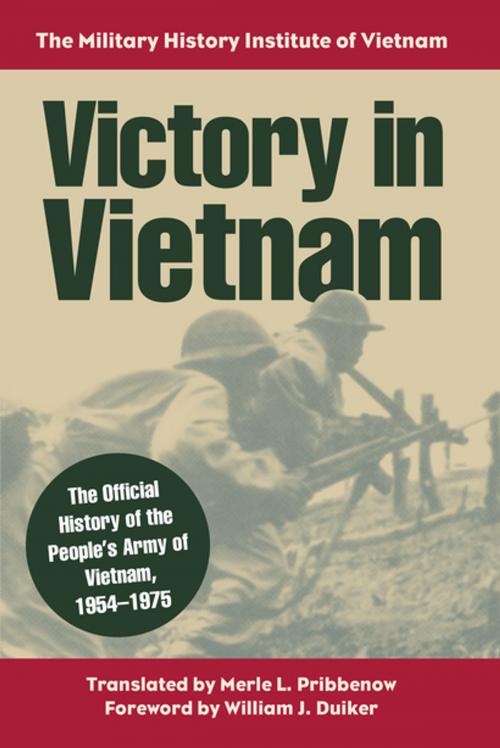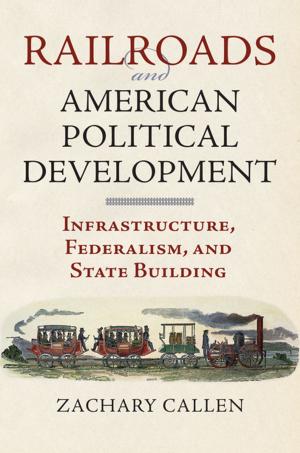Victory in Vietnam
The Official History of the People's Army of Vietnam, 1954-1975
Nonfiction, History, Asian, Asia, Military, Vietnam War| Author: | ISBN: | 9780700622313 | |
| Publisher: | University Press of Kansas | Publication: | May 1, 2002 |
| Imprint: | University Press of Kansas | Language: | English |
| Author: | |
| ISBN: | 9780700622313 |
| Publisher: | University Press of Kansas |
| Publication: | May 1, 2002 |
| Imprint: | University Press of Kansas |
| Language: | English |
What was for the United States a struggle against creeping Communism in Southeast Asia was for the people of North Vietnam a "great patriotic war" that saw its eventual victory against a military Goliath. The story of that conflict as seen through the eyes—and the ideology—of the North Vietnamese military offers readers a view of that era never before seen.
Victory in Vietnam is the People's Army of Vietnam's own account of two decades of struggle, now available for the first time in English. It is a definitive statement of the Vietnamese point of view concerning foreign intrusion in their country since before American involvement—and it reveals that many of the accepted truths in our own histories of the war are simply wrong.
This detailed account describes the ebb and flow of the war as seen from Hanoi. It discloses particularly difficult times in the PAVN's struggle: 1955-59, when Diem almost destroyed the Communist movement in the South; 1961-62, when American helicopter assaults and M-113 armored personnel carriers inflicted serious losses on their forces; and 1966, when U.S. troop strength and air power increased dramatically. It also elaborates on the role of the Ho Chi Minh Trail in the Communist effort, confirming its crucial importance and telling how the United States came close to shutting the supply line down on several occasions.
The book confirms the extent to which the North orchestrated events in the South and also reveals much about Communist infiltration—accompanied by statistics—from 1959 until the end of the war. While many Americans believed that North Vietnam only began sending regular units south after the U.S. commitment of ground forces in 1965, this account reveals that by the time Marines landed in Da Nang in April 1965 there were already at least four North Vietnamese regiments in the South.
Translator Merle Pribbenow, who spent several years in Saigon during the war, has sought to render as accurately as possible the voice of the PAVN authors, retaining much of the triumphant flavor of the text in order to provide an uncensored feel for the Vietnamese viewpoint. A foreword by William J. Duiker, author of Ho Chi Minh: A Life and other books on Vietnam, puts both the tone and content of the text in historical perspective.
What was for the United States a struggle against creeping Communism in Southeast Asia was for the people of North Vietnam a "great patriotic war" that saw its eventual victory against a military Goliath. The story of that conflict as seen through the eyes—and the ideology—of the North Vietnamese military offers readers a view of that era never before seen.
Victory in Vietnam is the People's Army of Vietnam's own account of two decades of struggle, now available for the first time in English. It is a definitive statement of the Vietnamese point of view concerning foreign intrusion in their country since before American involvement—and it reveals that many of the accepted truths in our own histories of the war are simply wrong.
This detailed account describes the ebb and flow of the war as seen from Hanoi. It discloses particularly difficult times in the PAVN's struggle: 1955-59, when Diem almost destroyed the Communist movement in the South; 1961-62, when American helicopter assaults and M-113 armored personnel carriers inflicted serious losses on their forces; and 1966, when U.S. troop strength and air power increased dramatically. It also elaborates on the role of the Ho Chi Minh Trail in the Communist effort, confirming its crucial importance and telling how the United States came close to shutting the supply line down on several occasions.
The book confirms the extent to which the North orchestrated events in the South and also reveals much about Communist infiltration—accompanied by statistics—from 1959 until the end of the war. While many Americans believed that North Vietnam only began sending regular units south after the U.S. commitment of ground forces in 1965, this account reveals that by the time Marines landed in Da Nang in April 1965 there were already at least four North Vietnamese regiments in the South.
Translator Merle Pribbenow, who spent several years in Saigon during the war, has sought to render as accurately as possible the voice of the PAVN authors, retaining much of the triumphant flavor of the text in order to provide an uncensored feel for the Vietnamese viewpoint. A foreword by William J. Duiker, author of Ho Chi Minh: A Life and other books on Vietnam, puts both the tone and content of the text in historical perspective.















